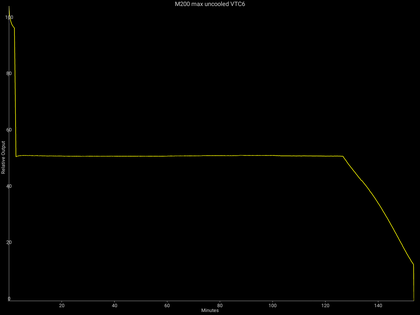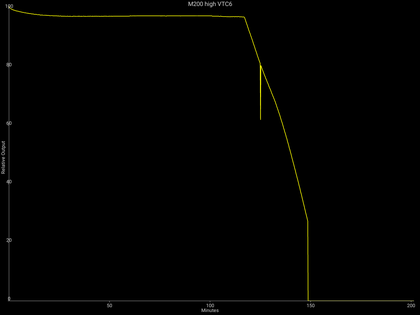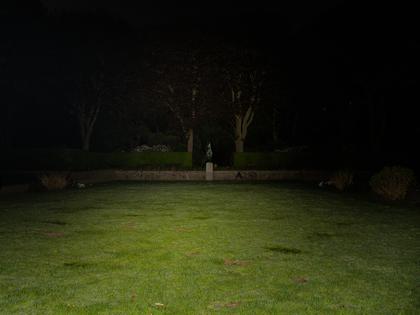This Skilhunt M200 was provided by Skilhunt for review.
Killzone Flashlights, a Skilhunt dealer for the US facilitated the arrangement. Here's the H04F RC at Killzone. Those are affiliate links to Killzone, and my affiliate coupon code "zakreviews" will get you 10% off most flashlights, including the M200.
Overview
The Skilhunt M200 is a medium-size everyday carry flashlight with an optional high-CRI LED, USB-magnetic charging, and a magnetic tailcap. At a glance, it has much in common with the more popular Olight Baton series, but offers features those lack such as LEDs with good color rendering and the ability to use standard 18650 batteries. Olight users will even find the user interface familiar, though more customizable once they switch to the second mode group.
The M200 is more compact and power-efficient than is typical of budget models, and its magnetic charging pad is more waterproof than a USB port, at a cost of using a proprietary cable. Its 944 lumen maximum output and 133m FL1 throw won't break any records in an age of hot-rod flashlights that burn the user's hand after a few seconds, but they're more than adequate for most situations a daily carry light would encounter. Ergonomically, it's mostly a simple tube, but both the switch and charging pad are on opposing plateaus. It can be hard to tell which is which by feel, but squeezing both is easy enough. The only real complaint is the pocket clip: it's bezel-up only and shallow-carry.
Mainstream users will find a lot to like in the M200, and I think enthusiasts won't feel left out either, as long as they can stand the pocket clip. The M200 is recommended.
Specifications
| Spec | - |
|---|---|
| Battery | 1x18650, 2xCR123A, 2x16340, 2x18350 |
| LED | Samsung LH351D |
| Color temperature | 5078K |
| Color rendering index | 91 |
| Max output | 944lm |
| Max throw | 133m |
| Max sustainable output | 485lm |
| Best efficiency | 141 lm/W @ 79lm |
| Candela per lumen | 4.7 |
| Length | 104.5mm |
| Head diameter | 23.5mm |
| Weight | 44g |
| Weight with battery | 90g |
| Charging | Proprietary USB-magnetic |
| Low Voltage Protection (LVP) | yes |
| Lockout | Mechanical and electronic |
| Approximate price | $47 |
| Rating | ★★★★☆ (recommended) |
Highlights
- High CRI
- Good efficiency
- Customizable modes
- Magnetic charging can be convenient
Lowlights
- Pocket clip is substandard
- Tint is a little green
- Magnetic charging is proprietary
Details and technical analysis
Versions
The M200 offers a choice of Cree XP-L or Samsung LH351D LEDs. This is the LH351D version.
Accessories
The M200 comes with a pocket clip, charging cable, lanyard, spare O-rings, and user manual.
Modes and user interface
There are two different UIs: mode group A, and B. A resembles Skilhunt's older products, while B is similar to UIs used by Acebeam, Olight, and Thrunite, but with more modes, and user control over what modes are available. Skilhunt uses L, M, H, and T 2 and 1 to designate the modes, in order of lowest to highest. Blinking modes are designated S 1-3.
Mode Group A
| State | Action | Result |
|---|---|---|
| Off | Click | Last used (except Turbo, Strobe) |
| Off | Hold | Low (last-used of L1, L2) |
| Off | Double-click | Turbo (last-used of T1, T2) |
| Turbo/strobe | Click | Last used |
| On | Hold | Off |
| On | Double-click | Toggle sub-mode (e.g. M1, M2) |
| Any | Triple-click | Strobe |
| Off | Hold 2S | Lockout |
| Off | Hold 5S | Mode group B |
Mode group B
| State | Action | Result |
|---|---|---|
| Off | Click | Last-used (except T1, S) |
| Off | Hold | Lowest enabled |
| On | Hold | Cycle through steady modes (except T1) |
| Any | Double-click | T1 |
| Off | Triple-click | Last-used strobe |
| Strobe | Double-click | Cycle variable strobe, slow beacon, fast beacon |
| Off | Hold 2s | Lockout |
| Lockout | Hold 2S | Lowest enabled |
| Off | Hold 5s | Mode group A |
| On | Triple-click | Config |
Note that while the lowest mode can be saved into memory, it is not saved when accessed using the shortcut from off.
Loosening the tailcap a quarter turn locks out activation mechanically.
Output, runtime, and efficiency
Advertised performance is with a Skilhunt 3500 mAh 18650 battery and Cree XP-L emitter. Tested performance is with a Sony VTC6 3000 mAh 18650 battery, which should result in slightly shorter runtime. This sample uses a Samsung LH351D emitter, which should have similar output and less throw.
| Mode | Advertised Lumens | Estimated Lumens | Advertised throw (FL1 meters) | Estimated throw (FL1 meters) |
|---|---|---|---|---|
| L2 | 0.5 | - | - | - |
| L1 | 10 | 20 | 16 | 17 |
| M2 | 25 | 34 | 25 | 25 |
| M1 | 70 | 79 | 43 | 38 |
| H2 | 150 | 155 | 62 | 52 |
| H1 | 370 | 374 | 98 | 81 |
| T2 | 535 | 532 | 118 | 97 |
| T1 | 1000 | 944 | 161 | 133 |
| T1 (2x18350) 1000 | 1051 | 161 | 141 |
| Mode | Estimated lumens | Advertised minutes | Minutes to 80% | Minutes to 50% | Minutes to 10% | Tailcap current (mA) | Efficiency (lm/W) |
|---|---|---|---|---|---|---|---|
| Standby | - | - | - | - | 0.039 | ||
| L2 | - | - | - | - | 5.5 | ||
| L1 | 20 | 9000 | - | - | 38 | 125 | |
| M2 | 34 | 1500 | - | - | 4737 | 60 | 135 |
| M1 | 79 | 600 | - | - | 3000 | 133 | 141 |
| H2 | 155 | 300 | - | - | 677 | 266 | 139 |
| H1 | 374 | 150 | - | - | 267 | 675 | 125 |
| T2 | 532 | 90 | 126 | 140 | 149 | 1120 | 112 |
| T1 | 944 | 92 | 2 | 128 | 153 | - | 112 |
Light quality
Reading taken from the center spot diffused with DC Fix diffusion film using an X-rite i1Pro spectrophotometer on medium.
| Color Temperature | Tint Duv | CRI | CRI R9 (deep red) | CRI R12 (deep blue) |
|---|---|---|---|---|
| 5078K | 0.0040 (very green) | 91 | 48 | 74 |
Beamshots
M200 (left) vs Zebralight SC64c LE (right)
Batteries and charging
The main battery for the M200 is a single 18650 Li-ion rechargeable. Any 18650 can be charged internally with the magnetic cable, and a 3000 mAh battery takes about 4 hours to charge.
Two CR123As, 16340s, or 18350s can be used as spares. They cannot be charged internally.
Modification potential
The M200's bezel unscrews easily, giving access to the reflector, MCPCB, and emitter. Any of the popular 3-volt, 3535 size emitters should work. It is likely possible to find alternate optics, such as TIRs. An Olight pocket clip from the Baton series can be used, even for a bezel-down orientation. This improves the M200's ergonomics.












Comments
You can use your Mastodon account to reply to this
Reply
Loading...